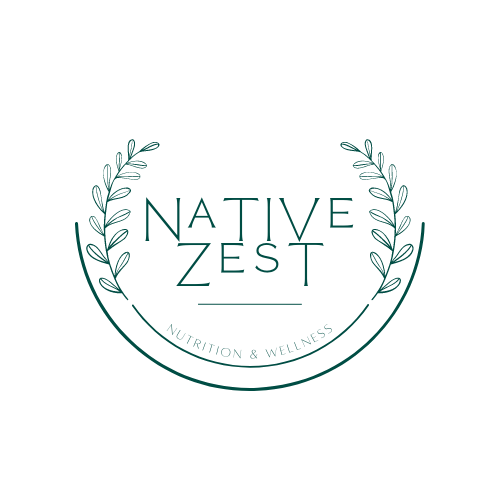
Balancing Hormones
The body goes through many changes as we age. It is important and beneficial to address these changes through a natural approach. By adjusting diet and lifestyle you can support your body in making this adjustment as comfortably as possible and improve quality of life.
Improve sleep, mood, and energy.


Foods to Love
- Soy
- Flaxseeds
- Leafy Greens
- Omega-3 Fatty Acids
- Fresh Herbs and Spices
- Citrus
- FRESH, VARIETY!
Soy and flaxseeds both contain compounds called phytoestrogens. Around the age of 50, the ovaries stop producing estrogen, an important hormone for our bones and muscles. Consuming phytoestrogens can reduce symptoms of reduced estrogen production like decreased muscle mass and bone mineral density, and weight gain. [1,2,3]
Activities to Love
- 30 minutes of exercise 5x/week incorporating both cardio and strength training
- Dine with friends and family
- Join social groups
- Meditation
Stress is a major contributor to hormonal imbalances and gastrointestinal issues. It’s not just about what you eat, lifestyle factors contribute to symptoms as well. The above activities help to improve mood, increase energy, and reduce muscle loss and loss of bone mineral density. Regular exercise has also been found to reduce symptoms associated with menopause including hot flashes. [1]
Healing Foods
Chronic stress has been found to be a common cause of irritable bowel syndrome (IBS) and can also have a negative impact on hormone balances.
Addressing stress through diet and lifestyle factors is an important component of healing. Let’s talk about how and why.
The Gut
- IBS can lead to increased sensitivity to foods, chronic fatigue, and abnormalities in gastrointestinal motility (constipation or diarrhea).
- Making more food at home is a sure way to start in healing the gut
- Increase fiber intake through a variety of fruits, nuts and vegetables
Why? Sugar and refined carbohydrates lead high blood sugar and insulin resistance and these have been shown to increase hot flashes. Increasing fiber helps to manage blood sugar and thereby, reduce hot flashes. [3]
The Mind
- Omega-3 fatty acids – supplementation of 2g/day for 8 weeks improved hot flashes and depression related to menopause. [1]
- Incorporate physical activity into weekly routine, however you can get it.
Why? – Physical activity can improve emotional state, social life, sleep, and energy levels. [5]
Gut health impacts hormone levels. The gut creates about 90% of the body’s serotonin, a neurotransmitter contributing to happiness and wellbeing. Dysbiosis impacts estrogen by disrupting the gut bacteria that metabolizes estrogen. The gut-brain connection is still being researched but studies have shown that gut health can impact anxiety and depressive disorders. Poor diet and high levels of stress are main contributors to gut imbalances. [6]

The Body
- Leafy greens are loaded with calcium and the bioavailability of calcium is much higher than that of calcium found in milk (which is only about 30% absorptive).
Why? – A diet high in sodium exacerbates the issue of calcium loss as sodium draws calcium out of the bone and increasing calcium loss from the kidneys. A diet high in sodium increases risk of poor bone mineral density and bone fracture which is already a concern when estrogen levels drop. [1,4]
References:
1. A Natural Approach to Menopause. Physicians Committee for Responsible Medicine. https://www.pcrm.org/good-nutrition/nutrition-information/a-natural-approach-to-menopause. Accessed May 25, 2019..
2. .Alan R. Gaby. Nutritional Medicine, 2nd Edition. 2nd ed. Concord, NH: Fritz Perlberg Publishing; 2017.
3. Menopause Diet: How What You Eat Affects Your Symptoms. Healthline. https://www.healthline.com/nutrition/menopause-diet. Published November 23, 2018. Accessed May 20, 2019.
4. Eating Right During Menopause. https://www.eatright.org/health/wellness/healthy-aging/eating-right-during-menopause. Accessed May 25, 2019.
5. Anamaria Cozma-Petrut, Felicia Loghin, Doina Miere, Dan Lucian Dumitrascu. “Diet in Irritable Bowel Syndrome: What to Recommend, Not What to Forbid to Patients!” World Journal of Gastroenterology 23, no. 21 (June 7, 2017)
6. How Gut Health Impacts Hormonal Balance. MaxLiving. https://maxliving.com/healthy-articles/gut-health-and-hormonal-imbalances. Accessed May 28, 2019.





